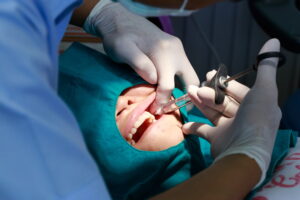How to Deal with Common Complications After Tooth Extractions?
 Whether standard and simple or surgical and more complex, dental extractions can come with complications, which is one of the reasons why patients dread these procedures so much.
Whether standard and simple or surgical and more complex, dental extractions can come with complications, which is one of the reasons why patients dread these procedures so much.
Some are common and manageable, whereas others are less common and their resolution requires the expertise of an oral surgeon. Fortunately, even uncommon complications can be intercepted early on if you recognize the signs and symptoms and return to the practice for a follow-up appointment.
How can patients from Escondido and nearby areas prevent post-emergency tooth extractions complications and how can they address them properly if they do arise?
How many teeth can be pulled safely at one time?
A competent oral surgeon can remove several teeth at the same time safely and efficiently. If a patient has several failing or loose teeth that cannot be salvaged and need to be removed, it is better to have them all extracted in a single appointment if possible. This makes the recovery process easier and more comfortable as the patient will need to follow the post-surgery aftercare routine the one time, as opposed to having to do it after each individual tooth extraction.
What is the most common complication following tooth extraction?
Complications that may develop after a dental extraction can be divided into two categories: common and uncommon ones. Uncommon complications such as maxillary bone infection are possible are extremely rare and highly unlikely.
Other complications which cause discomfort are considered common. They are either perfectly natural during the recovery period and caused by damage to the jawbone and gum tissue or temporary.
Common complications which may arise after surgical dental extractions include:
- Extensive swelling: Some swelling is normal for 2-3 days following an extraction. If it persists or increases after day 3, inform your doctor.
- Unusual pain: When persistent swelling is followed by intense pain, it is time to reach out to your oral surgeon.
- Persistent bleeding: Bleeding is part of the healing process and it normally lasts for a few hours following the extraction. If it persists, inform your oral surgeon immediately. Some blood-thinning medications may interfere with the healing process and lead to persistent bleeding, so let your doctor know if you are on any medication regimen prior to the surgery.
- Dry socket: This complication occurs when the blood clot at the extraction site becomes dislodged prematurely, which often happens when patients fail to follow aftercare instructions. The absence of the clot leaves your jawbone and nerves exposed to air and food particles, which can cause excruciating pain. Immediate medical attention is needed to take care of a dry socket, otherwise the patient may be at risk of a serious infection.
- Infections: Fatigue, high fever, flu-like symptoms, pain, and swelling could be indications of an infection that can develop for a number of reasons. In case of suspected infection, contact your doctor right away so they can help you put it under control.
- Nerve injury: This is a less common complication that occurs when a dental nerve sustains damage during the extraction. Experienced oral surgeons always take a close look at the X-rays or CT scan prior to the procedure to avoid this type of complication. Even if a nerve injury happens, it is usually temporary.
What increases the risk of complications after an extraction?
The number one culprit for complications following a dental extraction is failure to follow the recommended aftercare instructions provided by the oral surgeon. Patients can effectively prevent the vast majority of potential complications if they strictly follow these instructions and return for their scheduled follow-up appointment.
If complications do arise, patients are advised to schedule an emergency follow-up appointment so their complications can be intercepted early on. Unaddressed complications may escalate and aggravate the situation.
What is the recommended aftercare following a surgical dental extraction?
Each patient is unique and the process of recovery from a complex surgical dental extraction depends on various individual factors. This is why patients are given personalized aftercare instructions. Following these instructions helps prevent complications, makes way for a more rapid recovery process, and ensures the optimal outcome.
Safe emergency tooth extractions in the Escondido and Temecula area

Comments are closed.

